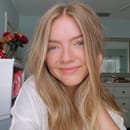This week, I had the pleasure of talking to Maddy Ball, a sophomore at Florida State University. Maddy was born with a congenital below-elbow amputee on the right side. She is majoring in exercise physiology with the hopes of studying prosthetics and orthotics in grad school, and she hopes to one day help people just like her! As a member of the USA women’s national sitting volleyball team, I asked her a few questions about how volleyball became a significant part of her life and how this pandemic has affected her training.
Her Campus (HC): When and why did you become passionate about volleyball?
Maddy Ball (MB): My whole life I have played a sport. Growing up, I enjoyed soccer, tennis and horseback riding, but it was not until one of my good friends started playing volleyball that I decided to give it a try. We hit the ball around together for fun, but I used my feet, while she used her hands. Then, the following summer I went to sleepaway camp and played beach volleyball every day, fell in love with it, and came home and told my parents I was quitting soccer. For me, volleyball was invigorating because it was something no one expected me to be able to do. As captain of my high school volleyball team, before each game, I remember shaking the opponent’s hands, and they were always shocked when one of mine was not real. Players from the other team were always passing to me because they assumed that I had a disadvantage. However, ultimately this became my advantage. Some people saw having one arm as a weakness, but on the court, this became one of my biggest strengths. It gave me the motivation to be the best.
HC: What do your weekly workout routine and eating habits consist of?
MB: As a part of the USA women’s sitting volleyball team, we are required to work out at least three days a week. My routine consists of a lot of arm and leg workouts involving resistance bands as well as weights to build strength in my right arm. Nutrition-wise, I eat a balanced diet consisting of a whole wheat grain, protein and veggie for every meal.
HC: What has been the hardest part about exercising during this pandemic?
MB: The hardest part has been getting to the point where I feel comfortable safely working out at the gym. In the beginning of quarantine, I was not comfortable using my neighborhood gym, so I resorted to a beach body on demand membership and at-home workouts that I was doing about five days a week. However, on June 4, I had a heart procedure, and working out became even more of a struggle.
HC: How do you think COVID-19 has and will continue to affect athletes?
MB: I believe that COVID-19 has greatly affected the physical performance of many athletes in that many did not have access to gyms or courts in the beginning of quarantine. However, I believe that the mental health of many athletes has had the greatest impact. Olympic and Paralympic athletes time their training in quads since the Olympics and Paralympics only happen every four years. Therefore, it has been difficult to come to terms with the fact that our three years of hard work has now turned into five. As an athlete in college, I plan everything from class scheduling to deciding whether to take classes that semester at all based off of competition scheduling and the length of events. We have all put our lives on hold working towards one incredible event, and pushing back that date has been very hard on everyone.
HC: What pushes you to continue working out when it can be hard and frustrating to find ways to exercise safely?
MB: As the newest member on my team, I want more than anything to prove others wrong and make the Tokyo 2021 Paralympic roster. Although it may be a far reach, I am going to continue working hard because if not Tokyo 2021, then I will definitely see you at Paris 2024! Wearing USA on my back and playing for my country is one of the best feelings that I have ever experienced, and I would love more than anything to keep doing that for as long as I can.
Want to see more HCFSU? Be sure to like us on Facebook and follow us on Instagram, Twitter and Pinterest!


